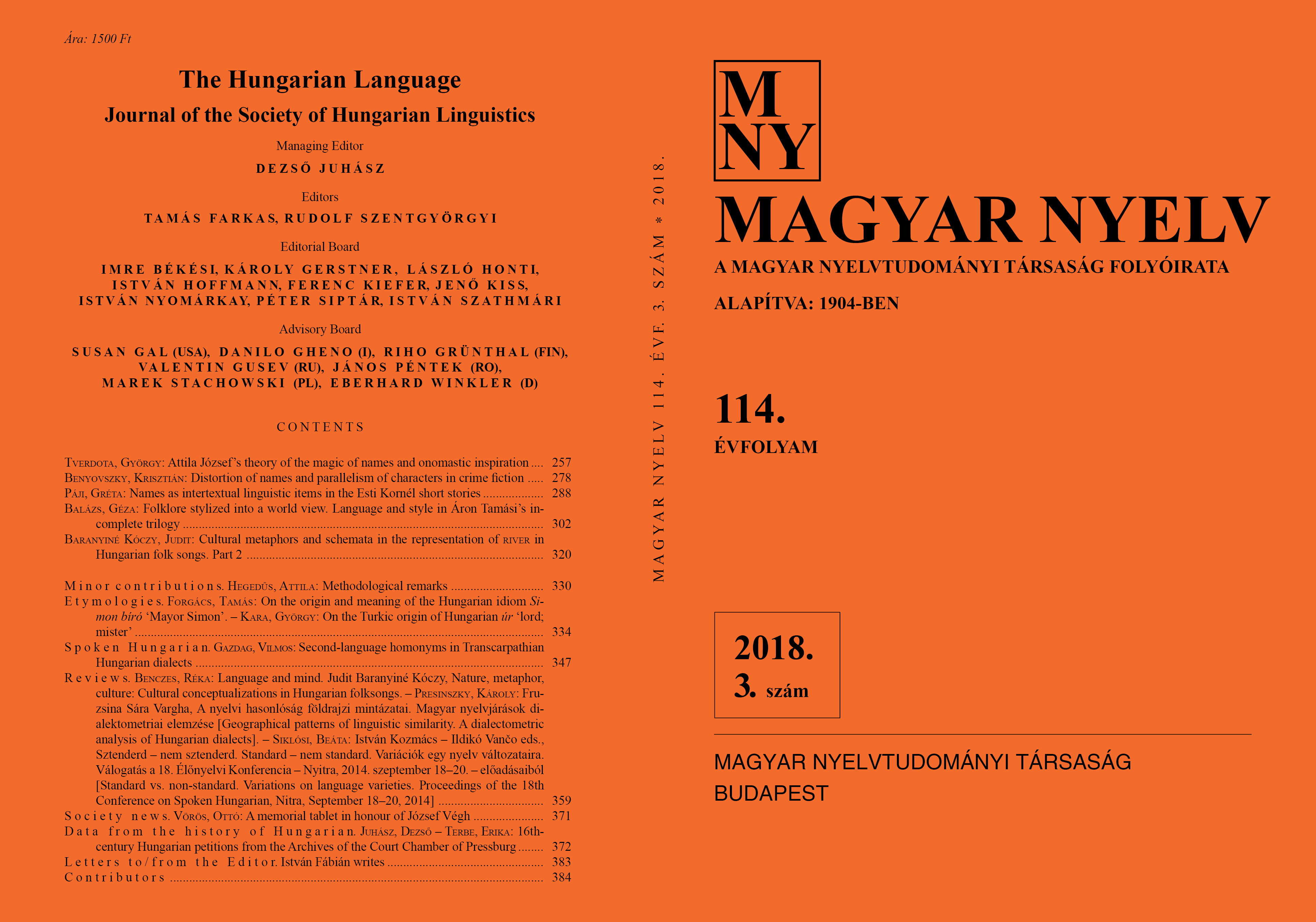Attila József’s theory of the magic of names and onomastic inspiration
József Attila névvarázs-elmélete és névtani ihlete
DOI:
https://doi.org/10.18349/MagyarNyelv.2018.3.257Keywords:
magic of names, magic of words, incantation, onomastic inspirationAbstract
The relationship between literature and onomastics is, in an overwhelming majority of cases, studied within the area of prose narratives. Such focusing of attention is reasonable, inasmuch as the practice of literary name giving provides copious food for thought and in fact enforces the exploration of that particular field. It is a slightly unusual case when it is a lyricist who finds himself intensely interested in onomastic problems. The case of Dezső Kosztolányi is even more complex: he had a significant oeuvre both in prose fiction and in poetry, and it is often difficult to tease apart his lyricist’s and prose writer’s motivation and experience in his numerous linguistic reflections on onomastic issues. The case of Attila József, the actual topic of the present paper, is far clearer. He built a theoretical conception of poetry around proper nouns. This is called his “theory of the magic of names”. In his theoretical discussions, the poet tried to unfold the secret of the power of words and to unravel the linguistic prerequisites of strong poetic effect. He struck upon the problem of name giving as he was investigating those issues. He then applied that knowledge, partly relying on personal experience and partly on theoretical points based on ethnological considerations, in creating his own poems. This aspect of his poetry is known as “onomastic inspiration”. The paper studies the first phase of that complex process. Later on, the poet adhered to that conception but complemented it with onomastic aspects of Freudian depth psychology. The study of those later developments will be a topic for another paper.
Downloads
Published
Issue
Section
License
Copyright (c) 2024 Szerkesztő MNy

This work is licensed under a Creative Commons Attribution-NonCommercial-NoDerivatives 4.0 International License.
Magyar Nyelv is a Diamond Open Access periodical. Documents can be freely downloaded and duplicated in an electronic format, and can be used unchanged and with due reference to the original source. Such use must not serve commercial purposes. In the case of any form of dissemination and use, Hungarian Copyright Act LXXVI/1999 and related laws are to be observed. The electronic version of the journal is subject to the regulations of CC BY-NC-ND (Creative Commons – Attribution-NonCommercial-NoDerivatives).
The journal permits its authors, at no cost and without any temporal limitation, to make pre-print copies of their manuscripts publicly available via email or in their own homepage or that of their institution, or in either closed or free-for-all repositories of their institutions/universities, or other non-profit websites, in the form accepted by the journal editor for publication and even containing amendments on the basis of reviewers’ comments. When the authors publicize their papers in this manner, they have to warn their readers that the manuscript at hand is not the final published version of the work. Once the paper has been published in a printed or online form, the authors are allowed (and advised) to use that (post-print) version for the above purposes. In that case, they have to indicate the exact location and other data of the journal publication. The authors retain the copyright of their papers; however, in the case of an occasional secondary publication, the bibliographical data of the first publication have to be included.



